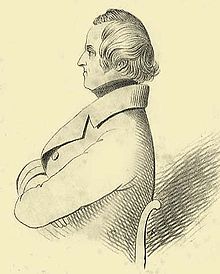Moritz Leopold Petri
Moritz Leopold Petri (born June 2, 1802 in Lage ; † July 28, 1873 in Detmold ) was a writer, judge, politician and chairman of the city council in Detmold.
life and work
Moritz Leopold Petri was born in 1802 in Lage, the eldest son of the judicial officer and later head of government in Lippe, Friedrich Simon Leopold Petri . With the support of Christian Friedrich Falkmann he was able to visit the Leopoldinum in Detmold. From 1820 to 1824 he studied law in Göttingen , Jena and Leipzig . As a student, he went on extensive hikes in many parts of Germany. During his studies in 1820 he became a member of the old Göttingen fraternity . After completing his law studies, he was appointed court trainee ( auditor ) at the Princely Court in Detmold in 1824 . He took a six-month leave of absence in order to undertake an educational trip through Europe, which took him back to Detmold via Brussels , France , Northern Italy , Vienna , Prague and Dresden . Further trips to Holland and England followed in 1830 and 1834, respectively. From 1825 to 1831 he was in-house counsel and from 1828 assessor at the court in Detmold. In September 1833 he was promoted to the judiciary and in 1845 appointed to the secret judiciary . From 1838 he was a deputy of the third estate in the Lippe state parliament and from 1844 a member of the Varenholz office . In the state parliament he was later committee deputy of the second estate (the committee was the three-person representation of the state parliament outside of the state parliament sessions).
Since 1835, together with the pharmacist Rudolph Brandes and the director of the Lemgoer Gymnasium Heinrich Schierenberg, he published the weekly Lippisches Magazin for patriotic culture and common good , which was published by Meyer Verlag in Lemgo , and was its editor from 1835 to 1848. In this paper he published essays and reports on local history, campaigns of the Lippe battalion, scientific and religious topics, Low German proverbs he had collected and much more. Petri was a friend of the Detmold playwright Christian Dietrich Grabbe . He was a founding member of the Resource Association in Detmold, which still exists today, and influenced the development of civil society in the city. In 1848 he played a leading role in the March Revolution in Lippe. During this time he was an extraordinary member of the state government and drafted a proclamation on March 9, 1848 by Prince Leopold II to the people of Lippe. He then represented the Principality in Frankfurt am Main . There he was initially a shop steward in the Committee of Seventeen , then an envoy to the Bundestag and then an agent at the provisional central authority (at times he also represented Waldeck there ). In 1850 he became a member of the Erfurt Union Parliament and after his father's death a regular member of the Lippe government in the same year. In 1868 he became a secret senior government councilor.
Petri was also one of the sponsors of the Hermannsdenkmal, which was planned as a national monument . Petri died on July 28, 1873 in Detmold at the age of 71. A street in Detmold was named after him.
His son was the mayor of Detmold Theodor Petri .
literature
- Helge Dvorak: Biographical Lexicon of the German Burschenschaft. Volume I: Politicians. Sub-Volume 4: M-Q. Winter, Heidelberg 2000, ISBN 3-8253-1118-X , pp. 300-301.
- Wilhelm Süvern: Moritz Leopold Petri - A tribute to the 100th anniversary of his death in Lippische Mitteilungen from history and regional studies . No. 43, pp. 167-220 of 1974.
- Ernst-Hermann Grefe: The Mediatization Question and the Principality of Lippe in the years 1848–1849, Diss., 1965, pp. 6-7
Web links
Individual evidence
- ^ Moritz Leopold Petri in the Lexicon of Westphalian Authors , accessed on March 10, 2010
- ^ Karl Meier-Lemgo : History of the City of Lemgo , page 207. Verlag FL Wagener, Lemgo 1952.
- ^ Lippe 1848 , accessed on May 8, 2013
| personal data | |
|---|---|
| SURNAME | Petri, Moritz Leopold |
| ALTERNATIVE NAMES | Petri, Moritz |
| BRIEF DESCRIPTION | German lawyer, politician and writer |
| DATE OF BIRTH | June 2, 1802 |
| PLACE OF BIRTH | Location (Lippe) in Germany |
| DATE OF DEATH | July 28, 1873 |
| Place of death | Detmold |
